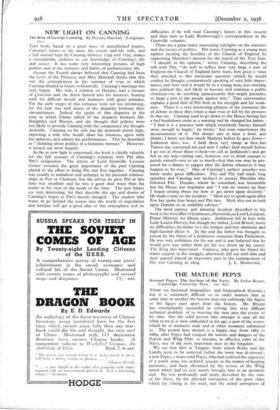NEW LIGHT ON CANNING
Tins book, based on a great mass of unpublished papers, Canning's letters to his aunt, his cousin and his wife, and a full journal kept by Canning between 1793 and 1795, makes a considerable addition to our knowledge of Canning's life and career. It has some very interesting pictures of high politics and of the manners and habits of parliamentary life.
George the Fourth always believed that Canning had been the lover of the Princess, and Miss Marshall thinks that this was the entanglement in the summer of 1795 to which Canning alluded in letters to Granville. Canning's marriage was very happy. His wife, a relation of Dundas, had a fortune of £100,000 and she threw herself into his interests, bearing with his difficult moods and humours with great patience. Yet the early stages of this romance were not too promising, for the lady was well aware of the disparity between their circumstances. Indeed she spoke of that disparity in the tone in which Emma talked of the disparity between Mr. Knightley and Harriet, and she thought that politics were not likely to provide Canning with the competency she thought desirable. Canning on his side put his demands pretty high, expecting a wife who would share his interests, agree, with his opinions, and admire his performances. This he described as " thinking about politics in a feminine manner." However, it turned out most happily.
So far as new light is concerned, the book is chiefly valuable for the full account of Canning's relations with Pitt after Pitt's " resignation. The letters of Lord Granville Leveson Gower revealed the great importance of the part Canning played in the effort to bring Pitt and Fox together. Canning was usually as maladroit and unhappy in his personal relation- ships as Fox or Chatham, but the advice he gave Pitt at this time was excellent and he was ' a good deal wiser than his leader in his view of the needs of the time. The new letters are very interesting, for they describe the ups and downs of Canning's hopes as Pitt's moods changed. The student who wants to go behind the scenes into the world of negotiation and intrigue will get a good idea of this atmosphere and its difficulties if he will read Canning's letters in this voiume and then turn to- Lady Bessborough's correspondence in the. Granville volumes.
There are a great many interesting sidelights on the manners and the tactics of politicS. Pitt warns Canning as a young man against exciting the hostility of the Church of England by supporting Sheridan's motion for the repeal of the Test Acts. " I should, in his opinion," writes Canning, describing the talk with Pitt, " do well to reflect how very large a part of England the Church of England party were, how great a value they attached to this particular question (which he would confess he thought comparatively speaking of very little impor- tance), and how rash it would be in a young man, just entering into political life, and likely to become and continue a public character—to do anything unnecessarily that might prejudice so large a part of the people against him." That conversation explains a good deal of Pitt both in his strength and his weak- ness. There is a very interesting glimpse of the strenuous life of debate in these days when a man rose or fell by his prowess in that art. Canning used to go down to the House fasting but a bad breakdown came as a warning and he changed his habits : " I find it is a practice with which everybody fancies himself stout enough to begin," he wrote, " but soon experiences the inconvenience of it. Pitt always eats at least a fowl, and drinks, I know not how much Madeira before he goes down— , Jenkinson does, too. I held them very cheap at first, but Turton has converted me and now I either feed myself before I go out at about three o'clock—or call at Jenkinson's and get fed on my way—taking care, however, not to drink enough to puzzle oneself—nor to eat so much—but that one may be pre- pared for a dinner or supper after the debate whenever it may happen to be over." One of Canning's earliest speeches was made under great difficulties. Fox and Pitt. had made long speeches and Canning was inclined to answer Sheridan who followed Pitt. Dundas, whom he consulted, was favourable but the House was impatient and " I was no sooner up than I began casting about me how to get down again decently." He made a note on the incident : "Mem not to speak again after Fox has spoke four-hours and Pitt two. Mem also not to look upon Dundas as an infallible adviser."
The most curious and amusing incident described in the book is the love affair of Jenkinson, afterwards, as Lord Liverpool, Prime Minister for fifteen years. Jenkinson fell in love with Lady Louisa Hervey, but though her father, Lord Bristol, made no difficulties, his father lo3t his temper and was obstinate and high-handed about it. In the end the father was brought to reason by the threat of a Jenkinson secession from Parliament. He was very ambitious for his son and it was believed that he would give way rather than see his son throw up his career. The King also intervened. Canning, who gave his friend his warm support in the struggle, afterwards fell out with him and their quarrel played an important part in the estrangement of


























































 Previous page
Previous page